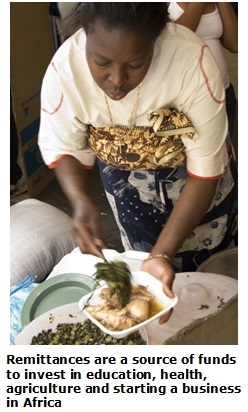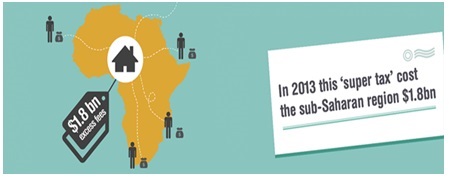 ReConnect Africa is a unique website and online magazine for the African professional in the Diaspora. Packed with
essential information about careers, business and jobs, ReConnect Africa keeps you connected to the best of Africa.
ReConnect Africa is a unique website and online magazine for the African professional in the Diaspora. Packed with
essential information about careers, business and jobs, ReConnect Africa keeps you connected to the best of Africa.



 Africa’s diaspora face high charges on remittances and the world’s poorest region is burdened with the world’s highest money transfer fees, say the findings of a new report on remittances from ODI
Africa’s diaspora face high charges on remittances and the world’s poorest region is burdened with the world’s highest money transfer fees, say the findings of a new report on remittances from ODI
Remittances – the money sent home by migrant workers – play a vital role in Africa. They help to pay for health, education and productive investment in agriculture. During periods of crisis they provide a financial lifeline. For many economies in the region, remittance transfers now occupy an important position in the balance of payments. The global community pledged to cut remittance fees to 5% by 2014, yet a new report shows that this ‘super tax’ has a long way to go.
The Overseas Development Institute report, ‘Lost in Intermediation: How excessive charges undermine the benefits of remittances for Africa’ by Kevin Watkins and Maria Quattri, was funded by Comic Relief and Unbound Philanthropy, and urges governments to increase competition in money transfer remittances and to establish greater transparency on how fees are set by all market operators.
These excess fees cost the African continent $1.8 billion a year; enough money to pay for the primary school education of 14 million children in the region.
This is because workers are paying an average of 12% in fees to transfer money back to relatives in Sub-Saharan Africa. To put that in context, a worker sending $200 home to provide for a relative’s education would incur an additional 25 dollars in costs.
Remittances to Africa: cutting the cost, harnessing the potential
To launch the report, ODI and Comic Relief brought together key UK and African representatives from the world of banking, money transfers and politics for an event on the huge cost to Sub-Saharan Africa of high money transfer fees. At the launch, ODI presented the findings of the report and held a number of panel sessions to explore the outcomes and offer solutions.
In the past year, $32 billion of remittances was sent to Africa. Although it varies across countries, remittances are about 2% of regional GDP on average. Nigeria is by far the biggest recipient and in countries like Lesotho and Senegal, remittances comprise a major source of GDP.
Remittances to Africa are rising. In 2013, transfers to the region were valued at $32 billion, or around 2% of GDP. Projections to 2016 suggest that remittances

could rise to over $41 billion. With aid set to stagnate, remittances are set to emerge as an increasingly important source of external finance.
Remittances are crucial for Africans to invest in human development. This can take the form of insurance against food insecurity, increasing foreign exchange reserves, and offer productive investment in agriculture and small enterprises.
Africa’s losses as set out in the report are based on the reported charges and market share of the major money transfer agencies operating in Africa, namely Western Union and Moneygram. The mid-range figure estimated of this loss is $586 million. There is essentially a lack of competition in the market place with these two companies dominating the market in payout locations.
According to some African governments, the money transfer operators and their associates are undertaking restrictive business practices with some banks and local operators. This clearly restricts new entry into the market place. There is also a lack of transparency about the foreign exchange costs and conversion fees.
In defence of money transfer operators, the increasingly stringent anti-money laundering regulations have increased the cost of compliance. African banking regulations are also a problem and, in some countries, limit payouts only to banks who can then charge high prices.
A Virtual Duopoly
At the launch, Kevin Watkins and Maria Quattri presented the ODI report and its findings. Their presentation highlighted the importance of remittances as a source of funds to invest in education, health, agriculture and starting business, or insure against crisis.
They showed the level of control Western Union and Moneygram have over the remittances market in Sub-Saharan Africa, leading to a virtual duopoly in many countries. They outlined the fee structures and some policy recommendations from their report.
His Excellency, Mr Williams Nkurunziza, High Commissioner of Rwanda to the UK, described his shocked reaction to the report, describing the combination of remittance fees and cost of finance on the African continent as “holding the African poor in a state of perpetual poverty”.
He criticised a market place that has been skewed beyond what is reasonable as a return on investment and profit.
“The monopoly is wrong. It is not fair or just,” he said. He pointed to the role of African institutions in this situation which, he said, is “putting poor people at a disadvantage.”
Over 100 African companies remit money, he said, but the focus has been placed on the big two because the stringent anti-money laundering requirements by Western and international banks and governments has enabled Western Union and Moneygram to dominate.
“We need to open the market and not create a situation where only the big guys can conduct honest business.” Pointing to solutions, he cited the need to liberalise markets, reduce exclusivity arrangements and cap charges.
“We also need to diversify the channels for money transfer. The proliferation of mobile money in Africa offers a great opportunity for doing this and thus scaling up access and cutting the cost of money transfer.”
The High Commissioner focused on how remittances help the needy in Africa and in Rwanda, decrying the fees as ‘irresponsible capitalism’. He offered his support for the recommendations outlined in the report advocating for a fair trade in money transfer services.
A Market Failure
UK Shadow Minister for Education, Rushanara Ali MP, highlighted the role remittances can play in countries where there is no formal banking system, such as in Somalia. Ali played a leading role in the successful ’Save Remittance Giving’ campaign to challenge Barclays in their decision to shut down remittances to Somalia and, in her view, there has been a market failure in remittances and a long-term solution is needed for remittances to countries without banking facilities. This should be based around ‘legitimate pathways’ to get money in effectively and affordably, avoiding concerns about money laundering or terrorism.
During a session that looked at strategies to lower charges, which could be summed up as competition and changes to regulations, Dilip Ratha, head of the Migration and Remittances Unit, at the World Bank, noted: “If you are waiting for the banks to cut the costs of remittances, you're barking up the wrong tree.”
Dominic Thorncroft, chairman of UK Money Transmitters Association, pointed out that his members were the “small community” enterprises that could provide cheaper deals but they were being “excluded” by banks. Abdirashid Duale, chief executive of Dahabshill – a firm specialising in sending money to Somalia – said: "It all started with 9/11" – before explaining how regulations since the terrorist attacks on the USA had made it very difficult for small firms to operate “even though none of the hijackers were from Africa”.
There was a consensus that regulations were needed to end big banks’ exclusive deals in some countries, rather than to keep out small operators.
Key Findings
The key findings in the report included the following:
To read the full report: www.odi.org/remittances-africa
Top image: Chris Kirchhoff, www.mediaclubsouthafrica.com
